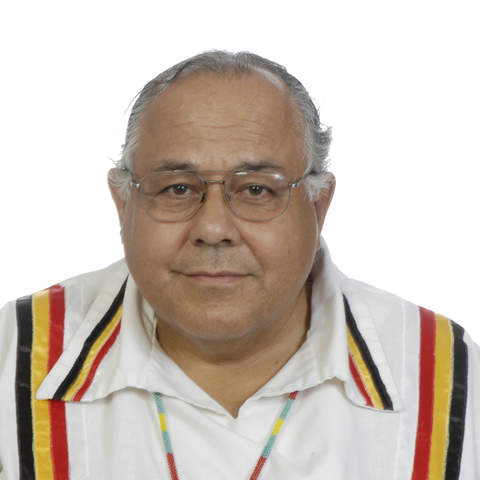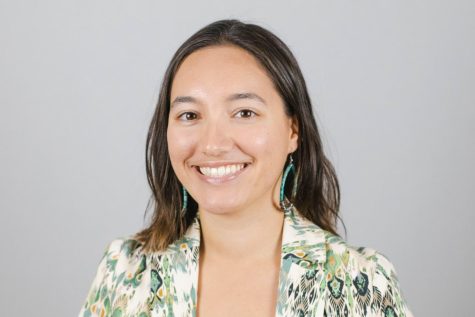Frank Ettawageshik, the keynote speaker for NMU’s Indigenous Peoples’ Day on Oct. 12, will be presenting at 6 p.m. via Zoom on his experiences as a Native American involved in Indigenous politics and art.
“I’m an artist. I’m a potter. I do traditional Woodland Indian pottery,” Ettawageshik said. “I’ve actually taught at a summer program there at [NMU] at the summer camp they did for Native kids.”
Pottery used to be a full-time occupation for Ettawageshik and he would make thousands of traditional pots from the Great Lakes area for museums and collectors around the world.
“I used to make 12,000 pots a year out of our studio and that was before tribal politics. Now I make maybe two dozen pots a year. I don’t make a lot of pots but I still am making pots and I still do some of the work and I still talk to people about it,” Ettawageshik said.
One of the locations Ettawageshik has his pots on display is the Michigan Historical Museum in Lansing. All of the traditional pottery the museum has on display are ones that he made for them when they opened in 1989.
“I was getting pretty well known for [pottery] when I started to get involved with tribal politics,” Ettawageshik said. “I became the tribal chairman of the Little Traverse Bay Bands of Odawa Indians and as the Tribal Chairman, I put most of my efforts into the issues of governance … and developing a strong administrative government for our tribe. I spent a lot of years doing that.”
Ettawageshik was the Tribal Chairman of the Little Traverse Bay Bands of Odawa Indians in Harbor Springs, Michigan for fourteen years and had served as the Vice Chairman and on the Tribal Council before then.
In the following years, he served many organizations and councils including the Michigan Indian Education Council, Michigan Climate Action Council, Michigan Offshore Wind Council, Michigan Water Use Advisory Council and the Great Lakes Water Quality Board of the International Joint Commission. He was also elected president of the Association on American Indian Affairs and has been serving as the Executive Director of the United Tribes of Michigan since 2009.
Ettawageshik has not only been involved in advocating for the rights of Indigenous Peoples at the state and national level but has gotten involved in international politics as well.
He is currently attending Zoom meetings representing the National Congress of American Indians at the United Nations Framework Convention on Climate Change and has participated in meetings of the World Intellectual Property Organization working to determine a framework for Indigenous intellectual property rights. This work has led him to places like Paris, Germany, Poland, Madrid, Spain and Switzerland.
“On an international basis, it is a real struggle to recognize Indigenous rights and it has been an ongoing struggle,” Ettawageshik said. “It took ten years, for example, to get an ‘s’ on the word ‘peoples’ in the [United Nations Declaration on the Rights of Indigenous Peoples].”
These struggles of Indigenous peoples that he has witnessed and is trying to combat around the world is part of what Ettawageshik hopes to share with students during his speech on the evening of Monday, Oct. 12. He also wants students to be able to have some interaction with him and the second part of his talk will be an open Q and A session where students can ask questions about his many life experiences.
Those experiences have led Ettawageshik into situations where he says he sometimes feels out of his comfort zone, but that is part of what makes them so rewarding.
“I believe that if you stay in your comfort zone in your life, you really don’t grow very much. It’s only when we get out of our comfort zone and stretch that envelope of our knowledge when we do those kinds of things, that helps us be a better human being,” Ettawageshik said.
Indigenous Peoples’ Day is not only providing an opportunity for Ettawageshik to share his stories and advice, but is also a place where students can learn about ways they can join the fight against injustices as well.
“I’ve had a lot of experience in my life in a whole variety of ways in a lot of different places all over the world. I have an opportunity here to speak to some of those issues that are facing Indigenous peoples, not just in our immediate vicinity, but within the region, within the nation, [and] within the world,” Ettawageshik said. “In some places, we are being shot and in other places we are being killed by a thousand cuts of bureaucracy. It is important for people to be aware of the roots of our inherent rights and the amount of interaction that is available to people and how they can best use their talents to help mitigate a lot of these issues.”






























